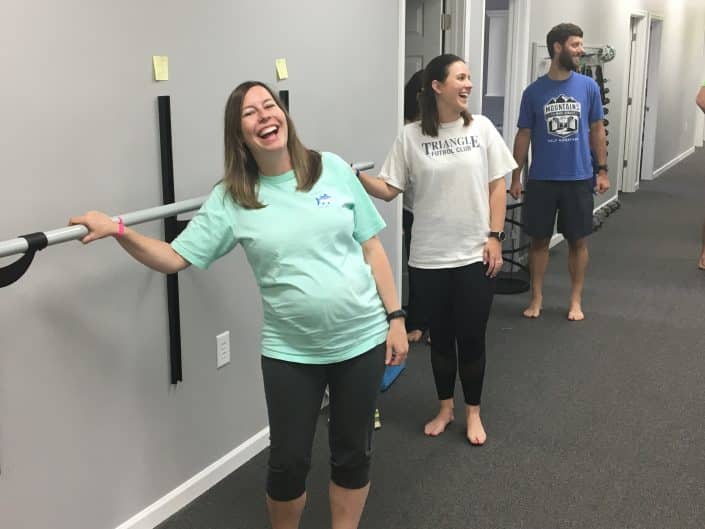Pregnancy and Physical Therapy
Did you know a physical therapist can effectively treat many diagnoses both during and after pregnancy? Few people are aware of this option, although the benefits are well worth it. A women’s health physical therapist can treat a large range of diagnoses, including but not limited to: back pain, pelvic pain, incontinence, carpal tunnel, headaches, painful intercourse and diastasis recti (separation of abdominal musculature). Often these symptoms are disregarded because of how commonly they occur with pregnancy. However, you do not have to suffer through these symptoms; we can help you overcome them for improved quality of life during pregnancy.
Why Would I Need Physical Therapy During Pregnancy?
During pregnancy, women experience many changes. As the baby grows, a mother’s ribs must expand, organs slide out of the way and the abdomen stretches. As the baby grows heavier, the pelvic floor also has more pressure being pushed down onto it. This extra pressure can cause pelvic floor symptoms, such as pelvic pain or incontinence. A women’s health physical therapist can work with you during pregnancy to reduce and/or prevent these symptoms altogether.
Pregnant women may also experience back pain, carpal tunnel and headaches during pregnancy. Poor posture, stress, the additional baby weight and the change in your center of gravity can all contribute to these symptoms. However, these are all musculoskeletal issues that physical therapists are able to address with positioning considerations, manual therapy techniques and gentle therapeutic exercises for optimal posture and strength. Any of these conditions can be effectively treated at any point in your pregnancy. Your physical therapist will evaluate you and provide an individualized plan of care aligned with your trimester of pregnancy.
Physical therapists can also provide tips and techniques for labor and delivery, while taking into consideration any musculoskeletal pain or impairments. Previous injuries or painful regions, especially in your back or hips, may become irritated or worsened from labor or delivery. To prevent this, you can set up a third trimester appointment with one of our women’s health physical therapists. During the third trimester visit, we will discuss your medical history, perform a thorough musculoskeletal evaluation and discuss potential laboring positions. We will also talk about the functions of the pelvic floor and how to prevent tearing during delivery. Then, following your third trimester visit, you can schedule a postpartum evaluation to ensure you are on track for a good recovery.
What About Postpartum Physical Therapy?
In the past few years, studies have shown that women do not feel they are adequately prepared for the postpartum experience, termed “the fourth trimester.” Typically, women are seen for many doctor visits before the baby is born but only one visit postpartum. In 2018, the American College of Obstetricians and Gynecologists published guidelines for postpartum care, which included a referral to physical therapy for urinary or fecal incontinence. It also explained that postpartum care should be an ongoing process, rather than just one visit.
There are many diagnoses a women’s health physical therapist can treat following delivery. A few common examples are: low back pain, pelvic pain, urinary or fecal incontinence, pain with sexual intercourse and diastasis recti (separation of abdominal musculature). Therapeutic exercise and manual therapy techniques are used during treatment of these depending on your individual presentation and symptoms.
A women’s health physical therapist can even be useful for a postpartum checkup to provide you with the necessary knowledge to prevent future issues. This can be especially important if you want to return to working out or running. It is even more highly recommended if you experienced a tear or surgical cut during your delivery to make sure your body heals correctly without any complications. A women’s health physical therapist can help you gradually return to your normal daily activities and manage any pelvic floor symptoms that occur along the way.
Exercise is also an important aspect of the recovery process postpartum. We can create a program focusing on strengthening and stability to improve motor control and overall well-being. A women’s health physical therapist is trained to do this, while also considering any postpartum complications to ensure your safety. If there is a post-surgical scar, this is extremely important so the scar is not re-opened from too much rigorous activity. A therapist can suggest adjustments and specific exercises based on your functional capabilities and limitations.
When to Call Us?
If you are experiencing any of the symptoms discussed above, women’s health or pelvic floor therapy may be a great option for you. This includes:
- Pain during or following pregnancy, especially pelvic pain, hip pain or low back pain
- Urinary or fecal incontinence (leakage) in general or during exercise
- Diastasis recti
- Pain with sexual intercourse
- Carpal tunnel
- Headaches
- Back pain
During your first visit, we will take a subjective medical history and chat with you about your goals. We will also perform a musculoskeletal exam of your trunk & lower extremities and, when indicated, an internal pelvic floor examination. Follow-up visits will include therapeutic exercise and manual therapy dependent upon the findings of your evaluation.
To schedule an appointment with one of our women’s health physical therapists, you can either give us a call directly or you can ask to be referred by your physician. Please don’t hesitate to also reach out if you have any questions or if you would like to learn more about pelvic floor physical therapy & what we can offer. We would love to help!
To schedule an appointment with one of our women’s health physical therapists, give us a call at one of our 12 locations in Greenville, Anderson, Spartanburg, Belton, Boiling Springs, Fort Mill, Powdersville, Seneca and Simpsonville, SC or you can ask to be referred by your physician.


